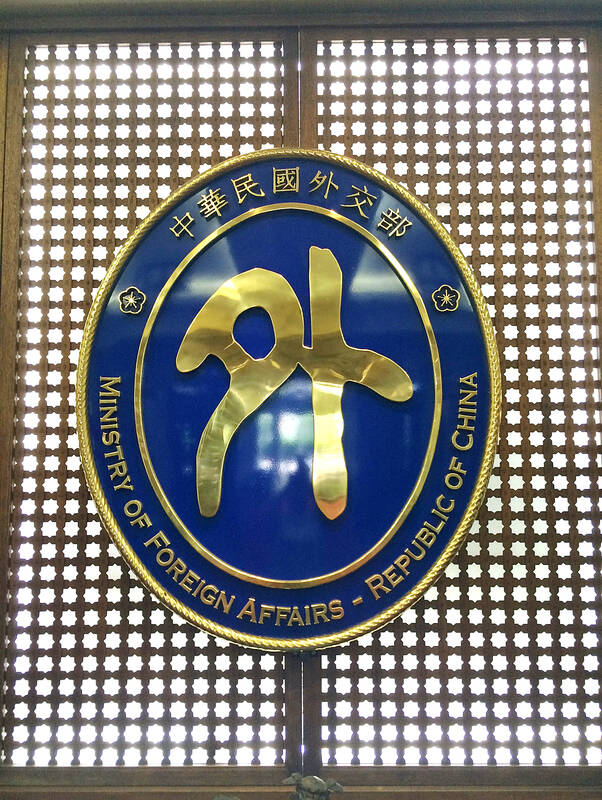The Ministry of Foreign Affairs (MOFA) yesterday said that cooperation in semiconductor development with Lithuania would continue despite the halting of construction of a joint-production chip factory in Vilnius.
The ministry in a statement confirmed that Teltonika, a technology group in Lithuania, has suspended construction of an industrial park in Vilnius containing 10 planned investment projects, including one between Taiwan and the Baltic state.
The stoppage is due to a shortage of electricity and an unresolved dispute over the conversion of land into industrial use.

Photo: Lu Yi-hsuan, Taipei Times
Arvydas Paukstys, Teltonika’s main shareholder, in a post on social media site LinkedIn said that because of the halt in the construction of the industrial park, the contract for purchasing semiconductor design services from Taiwan would have to be terminated.
In January last year, the government-sponsored Industrial Technology Research Institute (ITRI) signed an agreement with Teltonika for the semiconductor project in the industrial park to build chip production capacity in the European nation. The agreement was valued at 14 million euros (US$14.76 million).
The ministry said that despite the hiccup, the semiconductor partnership between Taiwan and Lithuania would continue.
ITRI was not immediately available for comment
Paukstys said the 10 factories’ investments in the 55-hectare Teltonika High-Tech Hill Park would be stopped.
The construction of the industrial park had been previously scheduled to be completed by 2028.
The Lithuanian news agency ELTA cited Paukstys as saying that a new chip industry would not be set up in the country due to the termination of the contract with Taiwan.
The Lithuanian investor in his LinkedIn post wrote that the investment would have created 6,000 new jobs earning an average salary of 10,000 euros a month, and added several billions of euros to Lithuania’s GDP.
He said Teltonika had faced difficulties in securing 63 megawatts of electricity, delaying the construction of a planned power distribution center.
Paukstys said that while the Lithuanian Ministry of Energy promised him there would be electricity supply for the park, when he approached LITGRID, an operator of electricity transmission networks, about providing electricity, the company said that due to ongoing projects, it did not have the capacity to participate.
Paukstys said that Teltonika leased state land to build four chip factories and a design center in the high-tech park as part of an agreement signed with the Lithunian Ministry of Economy and Innovation two years ago, but so far the land has not yet been converted for industrial use.
Paukstys said that under the agreement his group must implement the projects within five years, but the conversion of the land to industrial use has already taken the group two years, and the group would probably need another year to secure approval from Vilnius City Municipality for land use changes.
“We cannot even start designing the buildings, because neither the height nor the technical conditions of the construction are clear,” he said, adding that the delay would mean the company would be unable to complete the construction of the factories by 2027, and the Lithuanian Ministry of Economy and Innovation has declined to extend the contract.
Lithuanian National Radio and Television cited Paukstys as saying the Lithuanian government has blocked 3.5 billion euros in investment.

Taiwan is to commence mass production of the Tien Kung (天弓, “Sky Bow”) III, IV and V missiles by the second quarter of this year if the legislature approves the government’s NT$1.25 trillion (US$39.78 billion) special defense budget, an official said yesterday. Commenting on condition of anonymity, a defense official with knowledge of the matter said that the advanced systems are expected to provide crucial capabilities against ballistic and cruise missiles for the proposed “T-Dome,” an advanced, multi-layered air defense network. The Tien Kung III is an air defense missile with a maximum interception altitude of 35km. The Tien Kung IV and V

The disruption of 941 flights in and out of Taiwan due to China’s large-scale military exercises was no accident, but rather the result of a “quasi-blockade” used to simulate creating the air and sea routes needed for an amphibious landing, a military expert said. The disruptions occurred on Tuesday and lasted about 10 hours as China conducted live-fire drills in the Taiwan Strait. The Civil Aviation Administration (CAA) said the exercises affected 857 international flights and 84 domestic flights, affecting more than 100,000 travelers. Su Tzu-yun (蘇紫雲), a research fellow at the government-sponsored Institute for National Defense and Security Research, said the air

Taiwan lacks effective and cost-efficient armaments to intercept rockets, making the planned “T-Dome” interception system necessary, two experts said on Tuesday. The concerns were raised after China’s military fired two waves of rockets during live-fire drills around Taiwan on Tuesday, part of two-day exercises code-named “Justice Mission 2025.” The first wave involved 17 rockets launched at 9am from Pingtan in China’s Fujian Province, according to Lieutenant General Hsieh Jih-sheng (謝日升) of the Office of the Deputy Chief of the General Staff for Intelligence at the Ministry of National Defense. Those rockets landed 70 nautical miles (129.6km) northeast of Keelung without flying over Taiwan,

City buses in Taipei and New Taipei City, as well as the Taipei MRT, would on Saturday begin accepting QR code payments from five electronic payment providers, the Taipei Department of Transportation said yesterday. The new option would allow passengers to use the “transportation QR code” feature from EasyWallet, iPass Money, iCash Pay, Jkopay or PXPay Plus. Passengers should open their preferred electronic payment app, select the “transportation code” — not the regular payment code — unlock it, and scan the code at ticket readers or gates, General Planning Division Director-General Liu Kuo-chu (劉國著) said. People should move through the